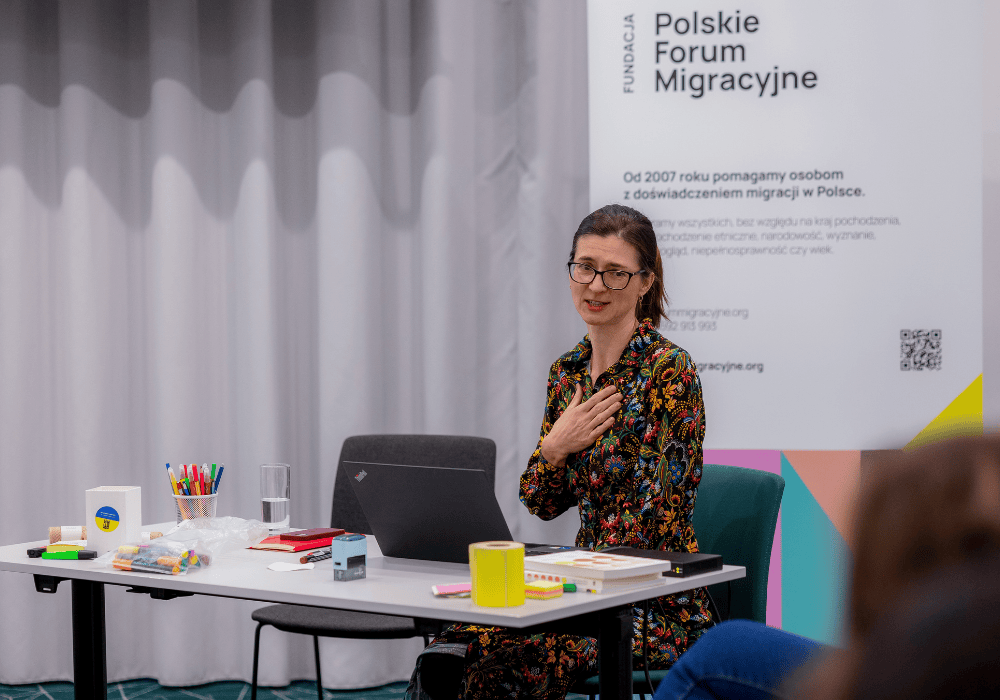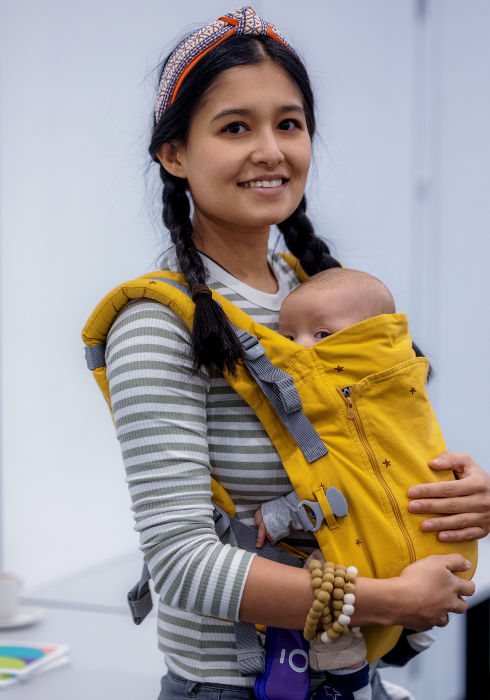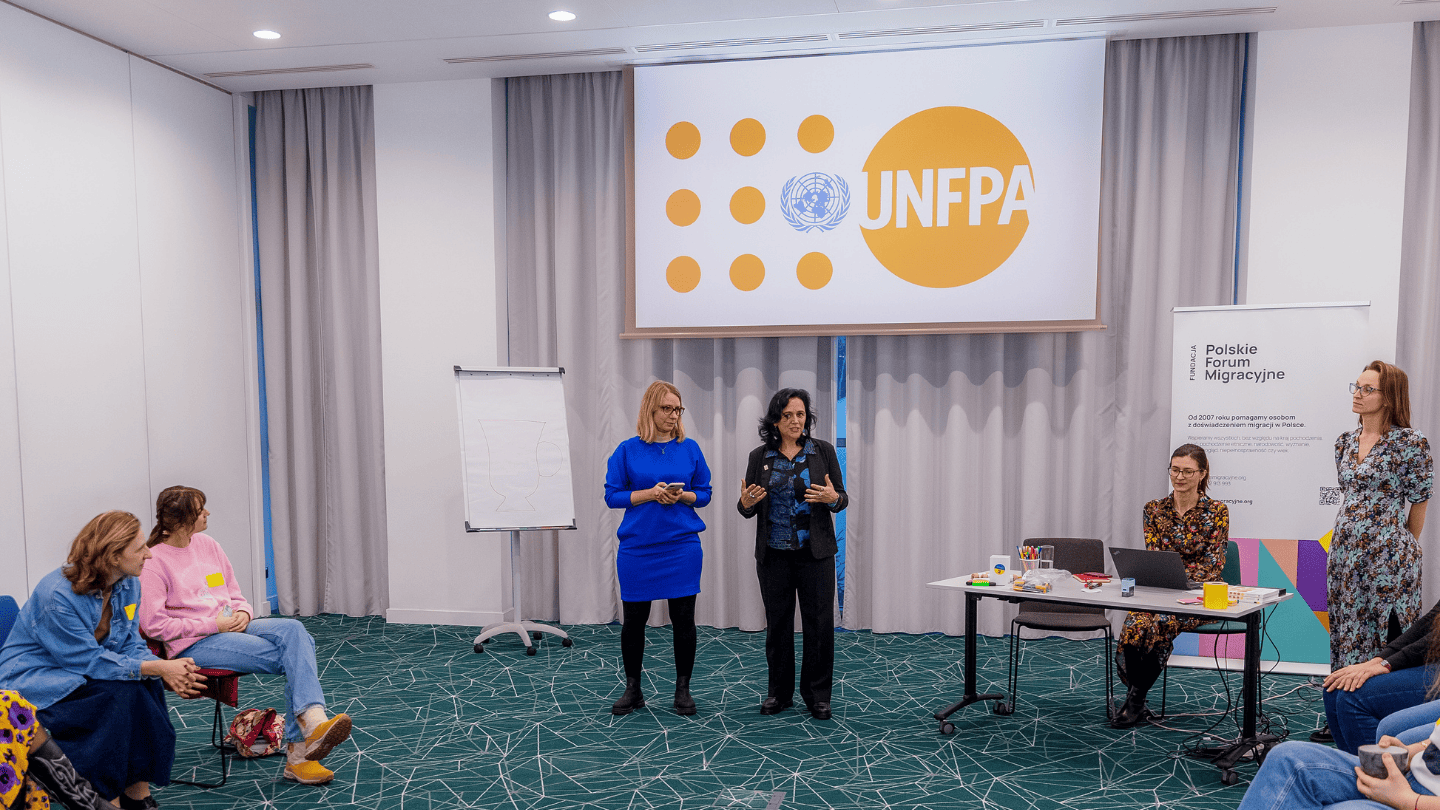WARSAW, Poland – When Anna (name changed for privacy), 28, fled the war in Ukraine and arrived in Poland, she was seven months pregnant with her first child. Her husband had been conscripted to fight on the frontlines and was unable to join her, leaving Anna without family or friends in a country she had never visited before. She was terrified of the life she and her newborn child would face ahead.
Almost one million Ukrainian refugees are currently registered for temporary protection in Poland, most of whom are women of reproductive age. In 2023, close to 15,000 Ukrainian women gave birth in Poland, constituting more than 5 per cent of all births in the country.
To ensure that women like Anna do not feel alone in their pregnancy and birthing journeys, UNFPA has partnered with the Polish Migration Forum to train local midwives and healthcare providers on trauma and culturally sensitive care. This programme aims to improve care for Ukrainian refugee women and build capacity throughout the Polish healthcare system.
Midwives play a vital role in guiding women through their pregnancy, delivery and postpartum period. They are often the first contact point for refugee women with the Polish health system, setting the foundation for maternal and newborn health. Midwives can also be a vital resource of information and support after birth, checking on the well-being of the mother and their newborn at home and connecting them with other support services.
Małgorzata Skalska, who is one of the leaders of the midwife training sessions, said the biggest challenges most Ukrainian women face when giving birth in Poland are language and communication barriers. The midwife trainings focus on ways to overcome these cross-cultural divides.
To help, the Polish Migration Forum published the information booklet "I am a mother in Poland," which provides detailed advice about pregnancy, maternal health and what to expect from the Polish healthcare system. The booklet was written in Polish and has been translated into various languages, including Ukrainian and Russian, so that all of the information is presented in two languages side-by-side. This has made it a useful translation tool, with Ukrainian patients able to point directly at the page to indicate what they need and midwives and healthcare workers reading the corresponding passage in Polish.
But Ms. Skalska said that while booklets and translation apps can ease the challenges, she teaches midwives that often the most important form of communication is non-verbal. “Touch, facial expressions, smiles are important,” she explained. “Even if they do not understand exactly, it shows we are here to take care of them.”

UNFPA and the Polish Migration Forum are working to ensure health providers have the understanding to deliver compassionate, culturally appropriate and trauma-sensitive care to refugee women.
Pregnancy and new motherhood bring intense physical and emotional changes. These experiences are even more pronounced for refugee women who are coming from crisis situations and must cope with being in a foreign country with a different language and birth customs, and often without any loved ones to support them.
Emotional distress caused by war, displacement and the isolation of refugee life can lead to increased risk of adverse outcomes in pregnancy, including premature births, low birth weights or other complications due to delays in seeking healthcare treatment.
The midwife training highlights the mental and emotional attention that Ukrainian women require in addition to physical care. “Without this kind of upskilling and multicultural training, you do not know what kind of feelings refugees from Ukraine have, what situations they survived, so you cannot empathize and help them properly,” said Marharyta Olshanska, a Ukrainian doula and perinatal psychologist who facilitates trainings with the Polish Migration Forum. “All of our work is aimed at creating this safe environment for these women in Poland.”
Ms. Olshanska fled from Ukraine to Poland weeks after fighting began in her hometown of Dnipro. Her background in childcare became known within the Ukrainian community in Warsaw, and she was asked by multiple women to accompany them during their delivery because they had no one else to rely on. She now organizes yoga classes and other activities for pregnant Ukrainian women, which not only helps them to physically and mentally prepare for the birthing experience, but also gives them a chance to socialize with people who share their experiences and speak the same language. “A lot of women here are alone, and this really affects their mental well-being,” noted Ms. Olshanska. “Just getting them together, to spend time together and create this sense of connection, they start to talk a lot, and it gives them strength.”

Those attending the training session expressed their eagerness to learn how to better serve the women in their communities and make them feel safe in their new surroundings. Lola Abbasova is a doula and breastfeeding consultant originally from Kyrgyzstan who moved to Poland in 2019. She said she understood why many Ukrainians had apprehensions about giving birth in Poland – a country they had been forced to flee to, with a healthcare system they did not understand or fully trust. But, Ms. Abbasova emphasized, having a supportive and empathetic healthcare team during childbirth could change attitudes: “It is a good chance to show them that it is safe here, to build trust and to let them feel comfortable and not be scared.”
The midwife trainer Ms. Skalska agreed, saying it was an opportunity to demonstrate the importance of midwives in supporting Ukrainian refugees and women in need: “When a woman is giving birth and she is happy with her experience – it may be hard, it may be long – but when she feels that she was surrounded by people who take care of her, she is stronger afterwards and she will always remember the midwife.”
-
This project was completed with funding from the United States Bureau of Population, Refugees and Migration.


